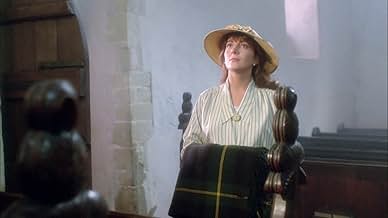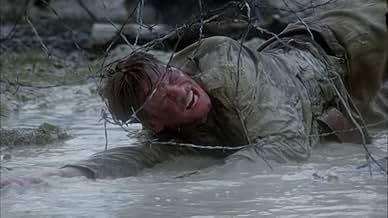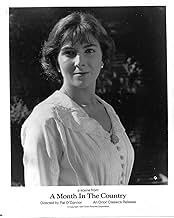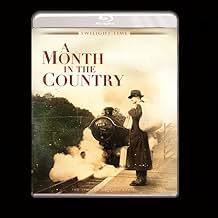AVALIAÇÃO DA IMDb
6,8/10
2,1 mil
SUA AVALIAÇÃO
Adicionar um enredo no seu idiomaTwo soldiers (Colin Firth, Kenneth Branagh) recover from World War I while spending a summer in a Yorkshire village.Two soldiers (Colin Firth, Kenneth Branagh) recover from World War I while spending a summer in a Yorkshire village.Two soldiers (Colin Firth, Kenneth Branagh) recover from World War I while spending a summer in a Yorkshire village.
- Prêmios
- 1 vitória e 1 indicação no total
Ken Kitson
- Mr. Sykes
- (as Kenneth Kitson)
- Direção
- Roteiristas
- Elenco e equipe completos
- Produção, bilheteria e muito mais no IMDbPro
Avaliações em destaque
When an arm or leg is removed, the amputee can continue to 'feel' it for some time afterwards. The phantom limb can hurt, or itch, or feel cold. But nothing is truly the same.
Similarly, the First World War irrevocably altered Britain, but in its immediate aftermath we limped on, unaware (or unwilling to admit) that anything had changed. It's this brief period of denial that Month in the Country illustrates: the moment when we teetered on the edge of the 19th century before toppling into the 20th.
Consequently, while it is a film of great heartbreak and loss, it is also one of great hope and triumph of the human spirit. There is one scene that perfectly illustrates this: a little girl visits her friend, who is sick in bed. She talks about the weather and her new hat and how they'll play together when her friend gets well. Then as she walks back home she says to Colin Firth
'She knows she's dying, doesn't she?'
It is as tragic for the girl to be so knowing and capable in the face of death as it is for young men to have experienced the hell of the trenches and return to indifference and hostility. But because of that tragedy they will go on to experience a more real, and potentially more joyful world, than the other inhabitants of comfortable and conventional Oxgodby.
Similarly, the First World War irrevocably altered Britain, but in its immediate aftermath we limped on, unaware (or unwilling to admit) that anything had changed. It's this brief period of denial that Month in the Country illustrates: the moment when we teetered on the edge of the 19th century before toppling into the 20th.
Consequently, while it is a film of great heartbreak and loss, it is also one of great hope and triumph of the human spirit. There is one scene that perfectly illustrates this: a little girl visits her friend, who is sick in bed. She talks about the weather and her new hat and how they'll play together when her friend gets well. Then as she walks back home she says to Colin Firth
'She knows she's dying, doesn't she?'
It is as tragic for the girl to be so knowing and capable in the face of death as it is for young men to have experienced the hell of the trenches and return to indifference and hostility. But because of that tragedy they will go on to experience a more real, and potentially more joyful world, than the other inhabitants of comfortable and conventional Oxgodby.
I've just watched this haunting movie for the second time, after an interval of several years and having just read the book on which it's based. I feel as though the director,actors, cinematographer took a walk inside my head to pluck the images that lived there as I read the book. Of course, it was those images inside THEIR heads that have made this film the masterpiece that it is...to enrich the heart, restore the soul. Colin Firth brought the character, Tom Birkin, so fully into life, with his sensitivity, conflicts, process of restoration (both as a skilled worker and as a damaged human being) and yearnings one wonders why such roles as this haven't been offered him since. His brooding Mr Darcy in the TV version of "Pride and Prejudice" used some of these talents, but not nearly enough. Kenneth Branagh's fine understated playing of the equally war damaged archaelogist (and a closet homosexual) is amazing and brilliant, considering especially his over-the-top performances in later films. Lovely Natasha Richardson creates just the right tone of controlled longing of the unhappily married Alice Keagh. Jim Carter and the rest of the cast are splendid as well. This is a film to return to again and again for its visual and soulful beauty, simplicity and depth. What an antidote for the juvenile,frentic blockbuster fare we're offered for the most part by the movie "business."
I adored the book by J. L. Carr, and was skeptical that Birkin's first person narrative could be conveyed on film. Firth brilliantly makes this internal landscape manifest, while the film provides a sumptuous external setting. All the lead cast strike an effective balance between intensity and restraint. Every time I view the movie, I see things that I hadn't noticed before.
I wish I had seen "A Month in the Country" on the big screen when it was released. The laserdisc looks good, though I wonder what I'm missing. Even though the laserdisc soundtrack is monophonic, it was striking enough to make a friend jump when we were viewed it.
I wish I had seen "A Month in the Country" on the big screen when it was released. The laserdisc looks good, though I wonder what I'm missing. Even though the laserdisc soundtrack is monophonic, it was striking enough to make a friend jump when we were viewed it.
I think this is the most-watched movie in my collection. Its strong passions are beautifully understated by the entire ensemble, which is the thing that I appreciate most in this film. All the cast are excellent, including the children (and I must add a special appreciation for Jim Carter, who has played opposite Firth in at least two other films that I know of), but this is an absolute tour de force for both Colin Firth and Kenneth Branagh. The viewer seems to share the pain and humiliation borne by the sufferers of "shell shock". Their encounters with the joy and grief inherent in the life and people of a small Yorkshire village are both poignant and humorous.
The slow pace enriches the character development and story. It mirrors the patient process of both leading characters' pursuits: Firth's character uncovers a medieval church mural slowly and carefully, as Branagh's seeks and uncovers a mysterious grave. Both work with an audience of curious local villagers by day, and wrestle with their personal demons by night. Slowly new bittersweet relationships develop as the summer progresses. I pity the impatient of this world who can't focus their attention long enough to take in or appreciate the rich content of the performances, the subtle direction, the beauty of both the cinematography and the music.
This movie is a gentle and uplifting experience each time it is viewed! A movie to be savored. I highly recommend it!
The slow pace enriches the character development and story. It mirrors the patient process of both leading characters' pursuits: Firth's character uncovers a medieval church mural slowly and carefully, as Branagh's seeks and uncovers a mysterious grave. Both work with an audience of curious local villagers by day, and wrestle with their personal demons by night. Slowly new bittersweet relationships develop as the summer progresses. I pity the impatient of this world who can't focus their attention long enough to take in or appreciate the rich content of the performances, the subtle direction, the beauty of both the cinematography and the music.
This movie is a gentle and uplifting experience each time it is viewed! A movie to be savored. I highly recommend it!
It is a movie like a good book, you want to cozy down with on a long winters night....it said more than it showed and it showed more than it said..the parting of Birkin and Moon mostly, Birkin, had me watching it several times,,what were the questions and the answers?...it reminded me of "Waiting for the Moon" with Linda Hunt...thanks
Você sabia?
- CuriosidadesPart of the movie is slightly out of focus. This is not due to its age or careless restoration, nor is it intentional. Director Pat O'Connor says in an interview included in the BFI Blu-ray/DVD edition released in 2016 that he was furious about it at the time.
- Erros de gravaçãoAccording to Alice Keach, her roses are the variety Sarah Van Fleet. However, the film is set in 1920 and Sarah Van Fleet roses were not introduced until 1926.
- Citações
Reverend Keach: Where do you intend to stay?
Birkin: Well, I thought, um... here.
Reverend Keach: Here? Where here?
Birkin: What about the belfry?
Reverend Keach: The belfry? I can't say that appeals to me, having somebody stay in the belfry. Shouldn't you take lodgings? A room in teh Shepherd's Arms?
Principais escolhas
Faça login para avaliar e ver a lista de recomendações personalizadas
- How long is A Month in the Country?Fornecido pela Alexa
Detalhes
Bilheteria
- Faturamento bruto nos EUA e Canadá
- US$ 443.524
Contribua para esta página
Sugerir uma alteração ou adicionar conteúdo ausente































